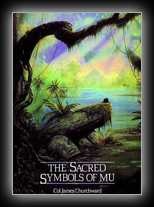
The Sacred Symbols of Mu
by James Churchward
1933
Mu, as a lost Pacific Ocean continent, was later popularized by James Churchward (1851–1936) in a series of books, beginning with Lost Continent of Mu, the Motherland of Man (1926), re-edited later as The Lost Continent Mu (1931).
Other popular books in the series are The Children of Mu (1931), and The Sacred Symbols of Mu (1933). Churchward claimed that "more than fifty years ago," while he was a soldier in India, he befriended a high-ranking temple priest who showed him a set of ancient "sunburnt" clay tablets, supposedly in a long lost "Naga-Maya language" which only two other people in India could read.
Having mastered the language himself, Churchward found out that they originated from "the place where [man] first appeared—Mu." The 1931 edition states that “all matter of science in this work are based on translations of two sets of ancient tablets:” the clay tables he read in India, and a collection 2,500 stone tablets that had been uncovered by William Niven in Mexico.
Churchward gave a vivid description of Mu as the home of an advanced civilization, the Naacal, which flourished between 50,000 and 12,000 years ago, was dominated by a “white race," p. 48 and was "superior in many respects to our own" p. 17
At the time of its demise, about 12,000 years ago, Mu had 64,000,000 inhabitants and many large cities, and colonies in the other continents. Churchward claimed that the landmass of Mu was located in the Pacific Ocean, and stretched east-west from the Marianas to Easter Island, and north-south from Hawaii to Mangaia.
He claimed that according to the creation myth he read in the Indian tablets, Mu had been lifted above sea level by the expansion of underground volcanic gases. Eventually Mu “was completely obliterated in almost a single night” p. 44: after a series of earthquakes and volcanic eruptions, "the broken land fell into that great abyss of fire" and was covered by "fifty millions of square miles of water." p. 50
Churchward claimed that Mu was the common origin of the great civilizations of Egypt, Greece, Central America, India, Burma and others, including Easter Island, and was in particular the source of ancient megalithic architecture.
As evidence for his claims, he pointed to symbols from throughout the world, in which he saw common themes of birds, the relation of the Earth and the sky, and especially the Sun.
Churchward claims the king of Mu was Ra and he relates this to the Egyptian god of the sun, Ra, and the Rapanui word for Sun, ra’a, which he incorrectly spells "raa."[8]: p. 48 He claimed to have found symbols of the Sun in “Egypt, Babylonia, Peru and all ancient lands and countries – it was a universal symbol.”[8]: p. 138
Churchward attributed all megalithic art in Polynesia to the people of Mu. He claimed that symbols of the sun are found “depicted on stones of Polynesian ruins,” such as the stone hats (pukao) on top of the giant moai statues of Easter Island. Citing W.J. Johnson, Churchward describes the cylindrical hats as “spheres” that "seem to show red in the distance”, and asserts that they “represent the Sun as Ra.” p. 138 He also incorrectly claimed that some of them are made of "red sandstone" [8]: p. 89 which does not occur in the island.
The platforms on which the statues rest (ahu) are described by Churchward as being “platform-like accumulations of cut and dressed stone,” which were supposedly left in their current positions “awaiting shipment to some other part of the continent for the building of temples and palaces.”: p. 89 He also cites the pillars “erected by the Maori of New Zealand” as an example of this lost civilization’s handiwork.: p. 158
In Churchward's view, the present-day Polynesians are not descendants of the dominant members of the lost civilization of Mu, responsible for these great works, but survivors of the cataclysm that adopted “the first cannibalism and savagery” in the world.
